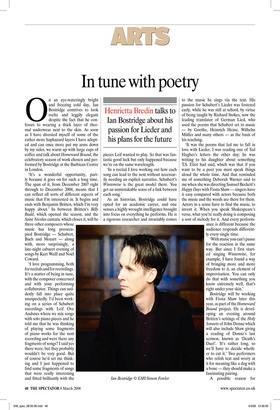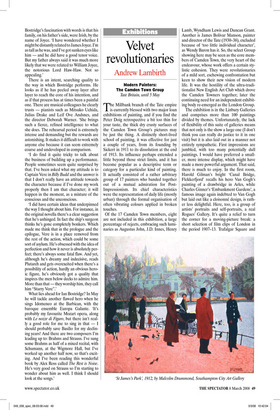In tune with poetry
Henrietta Bredin talks to Ian Bostridge about his passion for Lieder and his plans for the future
On an eye-wateringly bright and freezing cold day, Ian Bostridge contrives to look svelte and leggily elegant despite the fact that he confesses to wearing a thick layer of thermal underwear next to the skin. As soon as I have divested myself of some of the rather more haphazard layers I have adopted and can once more put my arms down by my sides, we warm up with large cups of coffee and talk about Homeward Bound, the celebratory season of work chosen and performed by Bostridge at the Barbican Centre in London.
‘It’s a wonderful opportunity, partly because it goes on for such a long time. The span of it, from December 2007 right through to December 2008, means that I can reflect all sorts of different aspects of music that I’m interested in. It begins and ends with Benjamin Britten, which I’m very happy about.’ In between Britten’s Billy Budd, which opened the season, and the Saint Nicolas cantata, which closes it, will be three other composers whose music has long preoccupied Bostridge — Schubert, Bach and Mozart — along with, more surprisingly, a late-night cabaret evening of songs by Kurt Weill and Noël Coward.
‘I love programming, both for recitals and for recordings. It’s a matter of being in tune, with the composer concerned and with your performing collaborator. Things can suddenly fall into place quite unexpectedly. I’d been working on a series of Schubert recordings with Leif Ove Andsnes where we mix songs with solo piano pieces and he told me that he was thinking of playing some fragments of piano works for the next recording and were there any fragments of songs? I said yes there were, but they probably wouldn’t be very good. But of course he’d set me thinking and I just happened to find some fragments of songs that were really interesting and fitted brilliantly with the pieces Leif wanted to play. So that was fantastic good luck but only happened because we’re on the same wavelength.
‘In a recital I love working out how each song can lead to the next without necessarily needing an explicit narrative. Schubert’s Winterreise is the great model there. You get an unmistakable sense of a link between each song.’ As an historian, Bostridge could have opted for an academic career, and one senses a highly wrought intelligence brought into focus on everything he performs. He is a rigorous researcher and invariably comes to the music he sings via the text. His passion for Schubert’s Lieder was fostered early, while he was still at school, by virtue of being taught by Richard Stokes, now the leading translator of German Lied, who used the poems that Schubert set to music — by Goethe, Heinrich Heine, Wilhelm Müller and many others — as the basis of his teaching.
‘It was the poems that led me to fall in love with Lieder. I was reading one of Ted Hughes’s letters the other day; he was writing to his daughter about something T.S. Eliot had said, which was that if you want to be a poet you must speak things aloud the whole time. And that reminded me of something Deborah Warner said to me when she was directing Samuel Beckett’s Happy Days with Fiona Shaw — singers have it easy compared with actors because both the music and the words are there for them. Actors in a sense have to find the music, to invent it. When you speak Shakespeare’s verse, what you’re really doing is composing a sort of melody for it. And every performance is different because the audience responds differently every single time.
‘With music you can’t pause for the reaction in the same way. But since I first started singing Winterreise, for example, I have found a way of bringing more and more freedom to it, an element of improvisation. You can only do that with something you know extremely well, that’s right under your skin.’ Bostridge will be working with Fiona Shaw later this year, as part of the Homeward Bound project. He is developing an evening around Britten’s settings of the Holy Sonnets of John Donne which will also include Shaw giving a reading of Donne’s last sermon, known as ‘Death’s Duel’. ‘It’s rather long, so we’ll have to decide whether to cut it.’ Two performers who relish text and worry at it for meaning like a dog with a bone — they should make a fascinating pairing.
A possible reason for Bostridge’s fascination with words is that his family, on his father’s side, were Irish, by the name of Joyce. ‘I have wondered whether I might be distantly related to James Joyce. I’m as tall as he was, and I’ve got sunken eyes like him — and he did have a good tenor voice. But my father always said it was much more likely that we were related to William Joyce, the notorious Lord Haw-Haw. Not so appealing.’ There is an intent, searching quality to the way in which Bostridge performs. He looks as if he has peeled away layer after layer to reach the core of his intention, and as if that process has at times been a painful one. There are musical colleagues he clearly trusts — pianists such as Mitsuko Uchida, Julius Drake and Leif Ove Andsnes, and the director Deborah Warner. ‘She brings such a fierce, refined intelligence to what she does. The rehearsal period is extremely intense and demanding but the rewards are astonishing. It makes it difficult to work with anyone else because it can seem extremely coarse and undeveloped in comparison.
‘I do find it quite tricky to talk about the business of building up a performance. People sometimes seem quite surprised by that. I’ve been asked what my attitude is to Captain Vere in Billy Budd and the answer is that I don’t really have an attitude towards the character because if I’ve done my work properly then I am that character; it will happen in the moment, as a mixture of the conscious and the unconscious.
‘I did have certain ideas that underpinned the way I thought about him. For instance, in the original novella there’s a clear suggestion that he’s unhinged. In fact the ship’s surgeon thinks he’s gone completely bonkers. Which made me think that in the prologue and the epilogue, Vere is in a place removed from the rest of the action, which could be some sort of asylum. He’s obsessed with the idea of perfection and how it never is absolutely perfect; there’s always some fatal flaw. And yet, although he’s dreamy and indecisive, reads Plutarch and gets overexcited when there’s a possibility of action, hardly an obvious heroic figure, he’s obviously got a quality that inspires the men below decks to admire him. More than that — they worship him, they call him “Starry Vere”.’ What lies ahead for Ian Bostridge? In May he will tackle another flawed hero when he sings Idomeneo at the Barbican, with the baroque ensemble Europa Galante. ‘It’s probably my favourite Mozart opera, along with Le nozze di Figaro, but there isn’t really a good role for me to sing in that — I should probably save Basilio for my declining years! And there are two composers I’m leading up to: Brahms and Strauss. I’ve sung some Brahms as half of a mixed recital, with Schumann, at the Wigmore Hall, but I’ve worked up another half now, so that’s exciting. And I’ve been reading this wonderful book by Alex Ross called The Rest is Noise. He’s very good on Strauss so I’m starting to wonder about him as well. I think I should look at the songs.’



















































































 Previous page
Previous page